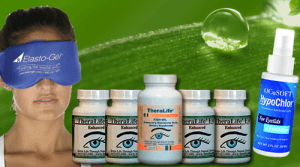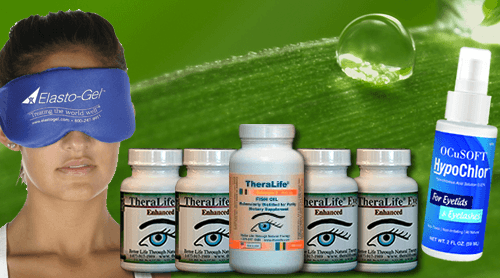Theralife.com offers a range of products that significantly benefit those managing blepharitis by focusing on supporting eye health and reducing inflammation. Their offerings include natural supplements that harness the anti-inflammatory properties of omega-3 fatty acids, antioxidants, and essential vitamins and minerals. These products are designed to complement an anti-inflammatory diet, which includes foods like salmon, walnuts, berries, and spinach, further aiding in soothing eye inflammation.
In addition to supplements, Theralife emphasizes the importance of hydration and provides guidance on maintaining optimal eye health through diet and lifestyle changes. By integrating their products into a daily routine, customers report improvements in symptoms and overall eye comfort, especially when combined with dietary adjustments that include vitamins A, C, and E, zinc, and selenium.
Theralife’s commitment to customer well-being is evident through their comprehensive resources and targeted solutions, ensuring a holistic approach to managing blepharitis and other eye-related conditions.
Best Blepharitis Treatment From TheraLife
Add To Cartrstanding and control of this persistent condition.
Key Takeaways
- Incorporate omega-3 rich foods like salmon and flaxseeds to reduce inflammation and support eye health.
- Consume antioxidant-rich fruits and vegetables, such as berries and spinach, to combat oxidative stress and eye inflammation.
- Include vitamin A sources like carrots and sweet potatoes for enhancing eye surface health.
- Ensure adequate hydration with water and hydrating foods like cucumbers to maintain eye moisture and reduce irritation.
- Integrate zinc and selenium-rich foods like oysters and Brazil nuts to support immune function and manage blepharitis symptoms.
Understanding Blepharitis and Its Symptoms
Blepharitis, though often overlooked, is a common eye condition that affects many people. You might wonder about the causes of blepharitis, and they can vary. It often results from bacterial infections, clogged oil glands in your eyelids, or skin conditions like rosacea. Understanding these causes is vital for effective management. The symptoms of blepharitis include red, swollen eyelids, itchy eyes, and a gritty sensation, which can be particularly uncomfortable. You might also notice crusting around your eyelashes upon waking. These symptoms can be persistent, making daily activities challenging. Regular eyelid hygiene is crucial to minimize symptom recurrence and maintain eye health. Recognizing the signs early and understanding the underlying causes is important for managing blepharitis effectively. By doing so, you can take proactive steps to relieve symptoms and maintain your eye health.
The Role of Diet in Managing Eye Inflammation
Managing blepharitis effectively involves more than just addressing its immediate symptoms. Eye inflammation can be markedly impacted by your diet, making dietary adjustments an essential part of your management plan. Research shows that certain foods can either exacerbate or alleviate inflammation. By incorporating anti-inflammatory ingredients and reducing consumption of inflammatory foods, you can support eye health and minimize flare-ups. Chronic dry eyes exacerbate inflammation and discomfort, which can lead to severe complications like meibomian gland dysfunction.
| Anti-Inflammatory Foods | Inflammatory Foods to Avoid |
|---|---|
| Leafy greens | Processed foods |
| Fatty fish | Sugary snacks |
| Nuts and seeds | Fried foods |
| Fruits | Refined carbs |
Making these dietary adjustments can help you manage eye inflammation more effectively. Emphasizing whole, nutrient-rich foods and minimizing processed options supports not only your eyes but your overall wellness.
Essential Nutrients for Eye Health
While managing eye health, it’s essential to focus on important nutrients that support ideal function and reduce inflammation. Vitamins A, C, and E, alongside minerals like zinc, play a significant role as preventive measures against eye conditions. Vitamin A supports the surface of your eyes, while vitamin C is a powerful antioxidant that protects against oxidative stress. Zinc aids in maintaining retinal health, important for low-light vision. Furthermore, Omega-3 fish oil is recognized for its strong anti-inflammatory properties, which can be beneficial for eye conditions like blepharitis. Additionally, lutein and zeaxanthin, carotenoids found in leafy greens, help filter harmful blue light, reducing eye strain. Incorporate a variety of colorful fruits and vegetables to guarantee you’re getting these nutrients.
Omega-3 Fatty Acids: A Key Player in Reducing Inflammation
When it comes to reducing inflammation, omega-3 fatty acids are a powerhouse that shouldn’t be overlooked. They play a vital role in inflammation reduction, which can be especially beneficial if you’re dealing with blepharitis.
Omega 3 benefits include supporting overall eye health and potentially alleviating symptoms associated with this condition. These essential fatty acids are found in foods like salmon, flaxseeds, and walnuts. Incorporating them into your diet can lead to a decrease in inflammatory markers, promoting healthier eyes.
Research suggests that omega-3s can help modulate the body’s inflammatory response, reducing discomfort and irritation. By making omega-3-rich foods a regular part of your meals, you’re taking a proactive step towards managing inflammation and supporting your eye health effectively. It is essential to note that omega-3 fish oil has shown mixed results regarding its effectiveness for dry eye symptom relief, emphasizing the need for further research.
Antioxidant-Rich Foods for Healthier Eyes
To enhance your eye health and combat blepharitis, incorporating antioxidant-rich foods into your diet is essential. These foods help boost your eyes’ defenses by reducing oxidative stress, a common contributor to eye inflammation. Consider adding colorful fruits and vegetables like berries, spinach, and carrots to your meals for a natural antioxidant boost. Additionally, omega-3 fatty acids found in fish oil supplements may support tear production and eye health, providing further benefits for those dealing with eye conditions.
Boosting Eye Defenses
As you consider ways to support your eye health, including antioxidant-rich foods in your diet can greatly enhance your eye defenses. Antioxidants such as vitamins C and E, beta-carotene, and zinc are essential for maintaining ideal eye function and protecting against damage. Foods like citrus fruits, nuts, leafy greens, and carrots are excellent sources of these nutrients. Alongside a nutritious diet, incorporating eye exercises can strengthen eye muscles and promote better vision. Regularly practicing stress reduction techniques, such as yoga or meditation, also supports overall eye health by reducing strain and fatigue. By combining these lifestyle choices, you can effectively boost your eye defenses and contribute to long-term ocular wellness, keeping conditions like blepharitis in check. For those with Sjögren’s syndrome, natural tear production can be revived through internal treatments, potentially improving dry eye symptoms.
Reducing Oxidative Stress
While many factors affect eye health, one of the most impactful is oxidative stress, which can be mitigated by consuming antioxidant-rich foods. Oxidative stress may contribute to eye inflammation and worsen conditions like blepharitis.
To protect your eyes, consider incorporating foods high in antioxidants into your diet. Berries, such as blueberries and strawberries, are excellent sources of vitamin C and flavonoids, which combat oxidative damage.
Leafy greens like spinach and kale provide lutein and zeaxanthin, essential for maintaining eye health. Nuts and seeds, rich in vitamin E and omega-3 fatty acids, also help reduce inflammation.
For those dealing with chronic dry eyes and conditions like blepharitis, products such as the TheraLife® Dry Eye One Month Starter Kit offer comprehensive treatment options aimed at rapid symptom relief.
The Benefits of Vitamin A and Beta-Carotene
You’ll find that Vitamin A and beta-carotene are key players in maintaining eye health, as they help prevent dryness and support proper functioning of the retina. Their anti-inflammatory properties can also alleviate symptoms associated with blepharitis. To guarantee you’re getting enough of these nutrients, incorporate foods like sweet potatoes, carrots, and leafy greens into your diet. Additionally, maintaining hydration is crucial for symptom relief, as it supports overall eye moisture and health.
Eye Health Boosters
Although many factors contribute to maintaining ideal eye health, vitamins play an essential role in supporting vision and overall eye function.
Vitamin A and beta-carotene, in particular, are important for keeping your eyes in top shape. They help maintain the surface of your eyes and are key for night vision. Rich sources include carrots, sweet potatoes, and leafy greens. To complement these nutrients, consider incorporating eye exercises and herbal remedies into your routine. Eye exercises can improve focus and reduce strain, while herbal remedies like bilberry extract may support retinal health. Additionally, it’s important to be aware that Sjogren’s syndrome, a systemic autoimmune disease, can affect eye health by causing dryness and irritation.
Anti-Inflammatory Properties
Exploring the benefits of vitamin A and beta-carotene reveals their significant anti-inflammatory properties, which can be particularly beneficial for managing blepharitis.
These nutrients help reduce inflammation, promoting healthier eyes and potentially easing symptoms of this chronic condition. Incorporating vitamin A and beta-carotene into your routine through herbal remedies or dietary supplements can be an effective strategy.
- Vitamin A: Supports the immune system and aids in reducing inflammatory responses in the body.
- Beta-Carotene: Converts into vitamin A in your body, offering a natural way to boost your vitamin A levels.
- Herbal Remedies and Supplements: These can be an accessible way to guarantee you’re getting adequate amounts of these nutrients, especially if dietary changes are challenging.
Increased tear production can be supported by maintaining a diet rich in omega-3 fatty acids, which have been shown to alleviate symptoms of dry eyes.
Embrace these strategies to support your eye health and manage inflammation.
Dietary Sources Guide
When aiming to boost your intake of vitamin A and beta-carotene, focusing on dietary sources can be a practical and effective approach. Foods rich in these nutrients, like carrots, sweet potatoes, and spinach, play an essential role in maintaining eye health and potentially alleviating blepharitis symptoms.
Vitamin A is vital for vision, while beta-carotene, its precursor, offers antioxidant benefits.
While herbal remedies and dietary supplements can support your diet, they shouldn’t replace nutrient-dense foods. Supplements may be useful if you struggle to meet your needs through food alone, but it’s best to consult with a healthcare professional before starting any new regimen.
Foods High in Vitamin C and E for Eye Protection
Protecting your eyes may involve incorporating foods rich in vitamins C and E into your diet. These nutrients play a significant role in safeguarding your vision by acting as powerful antioxidants. They help combat oxidative stress, a factor in eye conditions like blepharitis.
Consider these vitamin sources as natural eye supplements:
- Citrus fruits: Oranges, grapefruits, and lemons are excellent sources of vitamin C, essential for collagen production in the eyes.
- Nuts and seeds: Almonds, sunflower seeds, and hazelnuts pack a punch with vitamin E, supporting overall eye health.
- Leafy greens: Spinach and kale provide both vitamins C and E, along with other nutrients that can protect your eyes.
Incorporating these foods into your meals can be a proactive step in maintaining eye health.
Zinc and Selenium: Trace Minerals With Big Impacts
Although often overlooked, zinc and selenium are trace minerals that can have a significant impact on eye health, including conditions like blepharitis.
Zinc plays a vital role in immune function and reducing inflammation, which can help manage blepharitis symptoms. You can find zinc sources in foods like oysters, beef, and pumpkin seeds.
Selenium, on the other hand, offers powerful antioxidant benefits that protect your eyes from oxidative stress, a key factor in inflammation. Selenium benefits can be obtained through foods such as Brazil nuts, tuna, and eggs.
By incorporating these nutrient-rich foods into your diet, you support your overall eye health and help manage conditions like blepharitis more effectively.
Hydration and Its Importance in Eye Health
Staying properly hydrated plays an essential role in maintaining overall eye health, potentially alleviating symptoms of blepharitis.
When you’re hydrated, tears can effectively lubricate your eyes, reducing irritation and inflammation.
To support eye hydration, make sure you’re drinking enough water and consuming hydrating foods like cucumbers and watermelon.
Benefits of Proper Hydration
While maintaining ideal hydration levels might seem like common advice, it plays an indispensable role in eye health, particularly for those dealing with blepharitis.
Proper hydration benefits your eyes by ensuring they remain moist, reducing irritation associated with this condition. Adequate fluid intake helps support tear production, maintaining a protective barrier over the eye’s surface. This barrier is vital in preventing inflammation and dryness, common symptoms of blepharitis.
Consider these hydration benefits:
- Moisture Retention: Sufficient water intake keeps your eyes lubricated, minimizing dryness.
- Toxin Elimination: Staying hydrated assists in flushing out toxins that might exacerbate inflammation.
- Nutrient Transport: Proper hydration enhances the delivery of essential nutrients to the eyes, supporting overall eye health.
Hydration Sources for Eyes
When it comes to maintaining eye health, understanding the best sources of hydration is key. Proper hydration is essential for keeping your eyes moist and functioning well.
Drinking an adequate amount of water daily is one of the simplest hydration tips you can follow. Aim for at least eight glasses of water to support overall health and eye moisture.
Additionally, include foods with high water content, like cucumbers, oranges, and watermelon, in your diet. These foods not only hydrate but also provide important nutrients that benefit your eyes.
Herbal teas, such as chamomile or green tea, can also contribute to your hydration goals while offering antioxidants that promote eye health.
Creating a Balanced Meal Plan for Blepharitis Management
To effectively manage blepharitis, creating a balanced meal plan can play an essential role in alleviating symptoms. By focusing on meal prep and portion control, you can reduce inflammation and support eye health.
Start by incorporating anti-inflammatory foods rich in omega-3 fatty acids and antioxidants to combat eye irritation.
- Omega-3 rich fish: Salmon, mackerel, or sardines can be great weekly staples for reducing inflammation.
- Leafy greens: Spinach, kale, and broccoli are loaded with antioxidants and vital nutrients.
- Whole grains: Choose quinoa or brown rice to provide sustained energy and essential fiber.
Consistent meal prep helps maintain a balanced diet and guarantees you’re getting the right nutrients without overindulging.
Prioritize fresh, whole foods to support your eye health effectively.
Best Blepharitis Treatment From TheraLife
Add To Cartrstanding and control of this persistent condition.
Frequently Asked Questions
Can Stress Affect the Severity of Blepharitis Symptoms?
Yes, stress can definitely impact the severity of your blepharitis symptoms.
When you’re stressed, your body’s inflammatory response can be heightened, leading to more pronounced symptoms.
Effective stress management is essential to maintaining your emotional wellness and could help ease your symptoms.
Techniques like meditation, exercise, and adequate sleep can reduce stress levels, potentially improving your eye health.
Prioritize emotional wellness to mitigate the effects of stress on your condition.
Are There Any Specific Cooking Methods That Preserve Eye-Healthy Nutrients?
When you’re looking to preserve eye-healthy nutrients, use cooking methods like steaming vegetables and roasting nuts.
Steaming vegetables helps maintain their vitamin content and antioxidants, vital for eye health. Roasting nuts enhances their flavor without compromising their omega-3 fatty acids, beneficial for reducing inflammation.
Avoid overcooking, as it can degrade essential nutrients. By choosing these methods, you guarantee your meals support ideal eye function and overall health.
How Does Sleep Quality Impact Blepharitis and Overall Eye Health?
Your sleep quality greatly impacts blepharitis and overall eye health.
Good sleep hygiene promotes eye recovery by allowing your eyes to rest and repair, reducing inflammation and irritation. Lack of sleep can lead to increased eye strain, dryness, and discomfort, exacerbating blepharitis symptoms.
Are There Any Herbal Supplements Beneficial for Blepharitis?
You might wonder if herbal supplements can help with blepharitis. Some natural treatments, such as omega-3 fatty acids and green tea extract, show promise in reducing inflammation.
Herbal remedies like chamomile and calendula might soothe symptoms, but it’s essential to consult your doctor first.
Evidence suggests these supplements can complement conventional therapies, but they shouldn’t replace them.
Always prioritize safety and guarantee any treatment aligns with your overall eye health plan.
Can Screen Time Exacerbate Blepharitis Symptoms?
Isn’t it ironic? You love your gadgets, but they don’t always love your eyes back.
Yes, screen time can indeed exacerbate blepharitis symptoms. Staring at screens for prolonged periods often leads to digital eye strain, reducing your blink rate and causing eye irritation.
To mitigate these effects, take regular breaks following the 20-20-20 rule: every 20 minutes, look at something 20 feet away for 20 seconds. Your eyes will thank you.
Best Blepharitis Treatment From TheraLife
Add To Cartrstanding and control of this persistent condition.
Conclusion
Theralife.com offers a range of products specifically designed to benefit those suffering from eye conditions, such as blepharitis. Their products incorporate a blend of natural ingredients that help reduce inflammation and support overall eye health. By utilizing omega-3s, antioxidants, and essential vitamins and minerals, Theralife’s products work synergistically to nurture the eyes from within. Additionally, staying well-hydrated is emphasized as crucial for maintaining the effectiveness of these supplements. Using these products, customers can expect enhanced eye wellness and a potential reduction in symptoms associated with dry eyes and other related conditions. A well-rounded approach, combining Theralife’s products with a balanced diet, provides a comprehensive strategy for supporting eye health.





